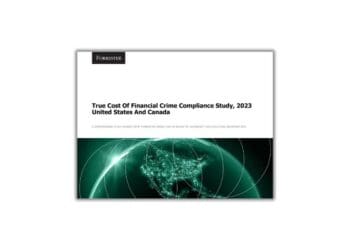The human toll of money laundering often goes unnoticed, as headlines describe details of scams. But, as FirstAML’s Simon Luke explores, when illicit funds are used to finance terrorism, the effects are both immediate and generational. As Luke asks, will the UK’s recent reform efforts be enough?
Editor’s note: This article’s author, Simon Luke, is UK country manager at FirstAML, an AML software provider.
“The cost of war is like an immeasurable tremor that knows no borders, its shockwaves reverberating across the world resulting in universal suffering,” Aysha Taryam wrote in her 2011 book, “The Opposite of Indifference.” The toll is unfathomable, and its devastating impact is not just felt as battles are waged — effects echo through generations across the globe.
In times of chaos and suffering, criminals often attempt to exploit the most vulnerable. This can take many forms. Risk of trafficking, for example, steeply increases due to the vast numbers of people who are forcibly uprooted. According to research by the Watson Institute for International and Public Affairs, over 38 million people in the war zones of Afghanistan, Iraq, Pakistan, Yemen, Somalia, the Philippines, Libya and Syria alone have been displaced in wars since 9/11.
In the wake of increasingly sophisticated tech, criminals are also seizing opportunities to grow and conceal illicit funds against the backdrop of wartime disarray. Crypto allows actors under sanctions a fresh means of skirting the financial system and the ability to move funds quicker than ever, further stretching the grounds of counter-terrorism funding (CTF).
We’ve seen it more recently, too, as Israel has moved to shut down Binance crypto accounts used by Hamas, as well as freezing affiliated bank accounts across the globe, while American regulators have taken similar steps. The reaction feels swift, but the truth is agencies are still catching up, confronted by rapidly evolving tech. For those who must comply with AML regulations, minimizing risk to your business is paramount.
It’s more important than ever to have tough Know Your Customer (KYC) systems in place, ensuring due diligence is carried out to prevent any nasty surprises further down the line. Critically, the question becomes: Do you actually know how your customers are funded?
Prompted by the Russian invasion of Ukraine in 2022, reforms to current AML frameworks, such as the UK’s Economic Crime and Corporate Transparency Act, have come to pass. But will they be robust enough to keep up with the changing face of financial crime and evolving technology? Due to the human cost, it’s vital the right calls are made.
Fighting Money Laundering Starts With Customer, Supplier Onboarding
With signs that money laundering is on the rise globally, many companies will point to their AML programs and assume they are covered. CreditSafe’s Matthew Debbage explains why that may not be the case for everyone.
Read moreThe funding of terrorism
The funding of terrorism has been well-documented, but the ways in which monetary support is being secured has evolved. Technology and the rise of cryptocurrencies have offered opportunities for anonymous activity; terrorist groups now seek funding through new sources like Paypal, Venmo and Telegram where numerous accounts can be set up and shut down quickly due to a lack of scrutiny.
While AML usually focuses on where illicit funds have come from, CTF concerns where funds are going, and, therefore, has substantially different risk indicators to consider. These are sometimes overlooked, and it’s these oversights that must be given more attention to stem the tide.
The importance of KYC and transaction monitoring
As financial criminals seek new ways to fund their illegal activities, compliance professionals and their KYC processes take on an even more significant role in tackling CTF. These processes must be completed early and thoroughly to minimize risk to a business, with particular attention needed for those from high-risk countries.
Regulators can come knocking for more information on mysterious clients much further down the line, so it’s best to be prepared. Failure to perform due diligence can have much wider ramifications; in addition to reputational damage to your firm, these illicit funds can be used for the purchase of weapons, resulting in devastation around the world. The human cost of poor KYC is not to be underestimated.
The same can be said for transaction monitoring, which refers to the observation of suspicious transfers, deposits and withdrawals by customers. Done effectively, it has the potential to rapidly alert banks to illegal activity and prevent funds from ending up in the hands of terrorist groups.
Learning lessons
When the invasion of Ukraine began in 2022, the UK government moved to seize Russian assets. By early 2023, more than £18 billion in Russian assets had been frozen and, more recently, new laws are set to be introduced to ensure these wares can be repurposed for Ukrainian compensation. However, the war also exposed shortcomings in the UK’s defense against money laundering; some have since argued that the failure to tackle “dirty money” allowed to flow through London in preceding years had actually freed up millions of pounds to finance Vladimir Putin’s invasion of Ukraine.
The UK government has responded by proposing reforms to anti-money laundering and counter-terrorism financing supervision. With consultation findings now being digested, it’s imperative that lessons are learned and the sector is better equipped to address London’s reputation as something of a dirty money soft touch.
The future
No one can predict global conflicts or when violence may erupt. But preparations in the AML sector can certainly be made ahead of time. Compliance professionals have a significant role to play when it comes to CTF; preparing more rigorous KYC processes and staying informed of the sophisticated methods of terrorist groups, and expanding regulations, will ensure effectiveness in the sector.




 Simon Luke is UK country manager at First AML. Simon has over 10 years of experience in banking and alternative credit in New Zealand and UK markets. Simon is responsible for First AML UK’s overall market strategy.
Simon Luke is UK country manager at First AML. Simon has over 10 years of experience in banking and alternative credit in New Zealand and UK markets. Simon is responsible for First AML UK’s overall market strategy.







